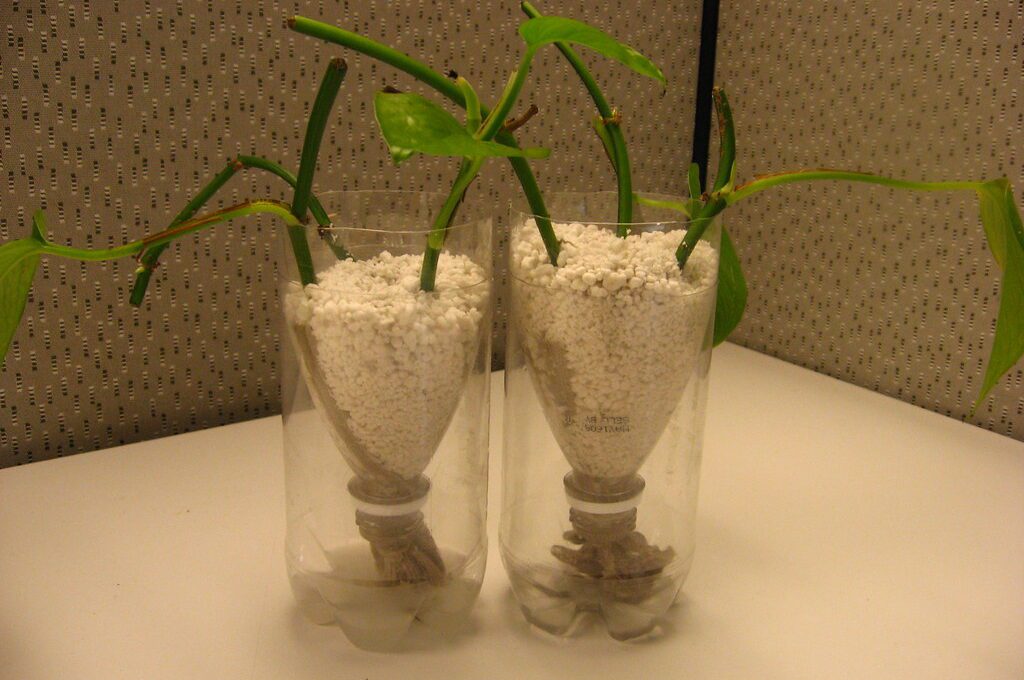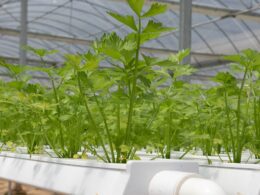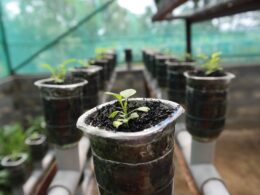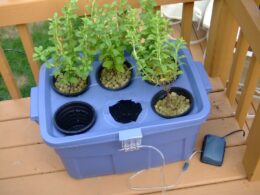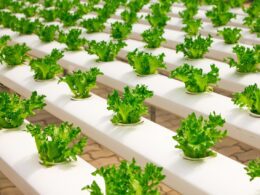Are you new to hydroponic gardening and wondering if you can overwater your plants? The short answer is yes, you can.
Hydroponic gardening involves growing plants without soil, using a nutrient-rich solution to feed the roots directly. While this method can be efficient and convenient, it also requires careful attention to the amount of water your plants receive.
Overwatering in hydroponics can lead to a range of problems, from nutrient deficiencies and root rot to stunted growth and a weakened immune system. It’s important to understand the risks and signs of overwatering so you can take action to prevent it and keep your plants healthy and thriving.
In this article, we’ll explore the basics of hydroponic gardening, the dangers of overwatering, and best practices for watering your hydroponic plants to ensure they get the right amount of water and nutrients they need to flourish.
Understanding the Basics of Hydroponic Gardening
If you’re new to hydroponic gardening, it’s important to understand the basics before diving in. Hydroponics is a method of growing plants without soil. Instead, plants are grown in a nutrient-rich solution that is delivered directly to the roots. This method of gardening can produce higher yields and faster growth rates compared to traditional soil-based gardening.
One of the most important aspects of hydroponic gardening is the use of hydroponic nutrients. These nutrients are essential for providing plants with the necessary nutrients for growth. There are many different types of hydroponic nutrients available, each designed for specific plant types and stages of growth.
It’s important to choose the right type of nutrient for your plants and to follow the manufacturer’s instructions for use. There are also different types of hydroponic systems, each with its own advantages and disadvantages. Some common types include deep water culture, drip irrigation, and nutrient film technique.
Each system has its own unique requirements for water and nutrient delivery, so it’s important to choose the right system for your plants and to monitor them closely to prevent overwatering. With the right knowledge and care, hydroponic gardening can be a rewarding and successful way to grow plants.
The Risks of Overwatering in a Hydroponic System
When it comes to hydroponic systems, excessive watering can pose serious risks that affect the health of your greenery. Overwatering can lead to potential damages such as root rot, which can be detrimental to your plants.
The roots of your plants need oxygen as much as they need water, and when they are soaked for too long, they begin to suffocate, leading to decay and eventual death of the plant. Another consequence of overwatering in hydroponic systems is nutrient depletion.
When you overwater your plants, it leads to nutrient leaching, which means that essential nutrients are washed away from the root zone. This can lead to nutrient deficiencies in your plants, which can stunt their growth and leave them vulnerable to diseases and pests.
It is important to maintain a proper balance of water and nutrient solution to ensure that your plants thrive in a hydroponic system. To avoid the risks of overwatering in a hydroponic system, you need to pay close attention to the moisture levels in your plants’ root zone.
You can do this by monitoring the water level in your reservoir and ensuring that you do not flood your plants’ roots with too much water. Additionally, you can use air stones to oxygenate your nutrient solution, which will help prevent root rot. By taking these precautions, you can maintain a healthy and thriving hydroponic garden.
Signs of Overwatering in Hydroponic Plants
It’s easy to tell if you’ve been a little too generous with the watering can, as your hydroponic plants will show signs of overwatering. Some common mistakes that lead to overwatering include watering too frequently or not allowing enough time for the growing medium to dry out between watering sessions. Overwatering can also exacerbate nutrient deficiencies in your plants, as the excess water can wash away essential nutrients before the roots have a chance to absorb them.
So, what are the signs of overwatering in hydroponic plants? Look out for drooping leaves, yellowing or browning of the leaves, and a lack of oxygen in the root zone. Overwatering can lead to root rot, which is caused by a lack of oxygen in the root zone. When the roots are suffocated, they can’t absorb nutrients or water, and the plant will begin to wilt and eventually die.
To prevent overwatering, make sure you’re allowing enough time for your growing medium to dry out between watering sessions and ensure that your plants are receiving the correct amount of nutrients and water.
Remember, overwatering can be just as harmful to your hydroponic plants as underwatering. By paying attention to the signs and being mindful of your watering habits, you can keep your plants healthy and thriving.
Don’t let nutrient deficiencies or root rot take hold – give your plants the right amount of water and nutrients they need to thrive.
How to Prevent Overwatering in a Hydroponic System
To prevent drowning your hydroponic garden, keep an eye on the moisture levels and give your greenery some breathing room between watering sessions. Overwatering can cause root rot and other issues that can harm or even kill your plants.
One way to prevent overhydration is to check the moisture level of your growing medium regularly. You can use a moisture meter, or simply stick your finger an inch deep into the medium to feel for moisture. If it feels wet or moist, wait until it’s dry before watering again.
Another way to prevent overhydration is to adjust your nutrient solution. If you notice that your plants are not growing well or are showing signs of overwatering, it may be time to adjust the nutrient solution. You can reduce the amount of nutrients you add to the water, or you can increase the frequency of the nutrient solution changes. This will help ensure that your plants are getting the right amount of nutrients and that they are not being overwatered.
Preventing overhydration: tips and tricks can save your hydroponic garden. By monitoring the moisture levels and adjusting nutrient solutions, you can help ensure that your plants are growing healthy and strong. Remember, overwatering can be just as harmful as underwatering, so pay attention to your plants’ needs and give them the care they deserve.
Best Practices for Watering Hydroponic Plants
As a hydroponic gardener, you need to master the best practices for watering your plants to ensure optimal growth and health. One crucial aspect to consider is the pH balance of the nutrient solution. The pH level should be maintained between 5.5 and 6.5, as this range is ideal for nutrient uptake by the plants. If the pH balance is too low or too high, your plants will struggle to absorb the nutrients they need, leading to stunted growth or even death.
Another important factor to consider is the frequency of watering. Unlike traditional soil gardening, hydroponic plants require more frequent watering. However, overwatering can be just as harmful as underwatering. It is crucial to monitor your plants’ moisture levels regularly and only water them when necessary. A good rule of thumb is to water your plants when the top inch of the growing medium feels dry to the touch. This will ensure that your plants receive enough water without drowning them.
In summary, maintaining the correct pH balance and watering frequency is crucial for the health and growth of your hydroponic plants. By regularly monitoring your plants’ moisture levels and implementing the best watering practices, you can ensure that your plants thrive in their hydroponic environment. Remember to keep the pH level between 5.5 and 6.5 and only water your plants when necessary. With these tips, your hydroponic garden will flourish, and you’ll be rewarded with a bountiful harvest.
Frequently Asked Questions
What is the best type of hydroponic system for preventing overwatering?
When it comes to hydroponics, preventing overwatering is critical for plant growth and health. One of the best ways to achieve this is by using a recirculating hydroponic system. This type of system allows for the water to be continuously recycled, reducing the risk of overwatering and ensuring that the plants receive the right amount of water and nutrients.
Additionally, when comparing different types of hydroponic systems for water management, recirculating systems have the added benefit of being more eco-friendly and cost-effective in the long run. By utilizing a recirculating hydroponic system, you can rest assured knowing your plants are getting the right amount of water while also benefiting the environment and your wallet.
Can overwatering in hydroponics lead to pests or diseases in the plants?
Overwatering in hydroponics can have negative effects on plant growth and lead to the development of pests and diseases. When the plants are overwatered, the roots become waterlogged, which can lead to root rot. This can cause the plant to become weak and susceptible to pests and diseases.
To prevent overwatering in hydroponic systems, it’s important to monitor the pH and nutrient levels of the water. You should also make sure that the water is circulating properly and that the roots aren’t submerged for too long. Using a hydroponic system that allows for proper drainage can help prevent overwatering.
By taking these precautions, you can help ensure that your hydroponic plants stay healthy and free from pests and diseases.
Is it possible to save overwatered hydroponic plants?
Reviving overwatered hydroponic plants is possible with proper hydroponic maintenance. First, remove any excess water from the system to prevent further damage to the plants.
Then, check the roots for any signs of rot or fungal growth, which may require pruning or treatment with a fungicide.
Adjust the nutrient solution to provide the right balance of nutrients for the plants, and monitor the pH levels to ensure they’re within the optimal range.
In addition, provide adequate lighting and ventilation to promote healthy growth. With these steps, you can help your overwatered hydroponic plants recover and thrive.
How often should you check the water level in a hydroponic system to prevent overwatering?
To ensure healthy plant growth in hydroponics, it’s important to monitor the water levels in your system regularly. Overwatering can have negative effects on your plants, such as root rot and stunted growth.
To prevent this, check the water level at least once a day and adjust as needed. It’s also important to pay attention to the type of plants you’re growing and their specific water needs.
By monitoring the water levels and adjusting accordingly, you can ensure that your plants are getting the right amount of water and nutrients they need to thrive in your hydroponic system. Remember, healthy plants lead to a successful harvest!
Are there any hydroponic plants that are more prone to overwatering than others?
When it comes to hydroponic plants, there are some that are more prone to overwatering than others. These include plants with shallow root systems, such as lettuce and herbs.
To prevent overwatering, it’s important to monitor the water level regularly and adjust as necessary. One technique is to use a water level indicator or timer to ensure the plants are receiving the proper amount of water. Another prevention technique is to allow the plants to dry out slightly between waterings, as this will encourage deeper root growth and prevent waterlogged soil.
By being mindful of these factors, you can ensure your hydroponic plants thrive without the risk of overwatering.
Conclusion
So, can you overwater plants in a hydroponic system? The answer is yes.
Overwatering can lead to a variety of issues such as root rot, nutrient deficiencies, and stunted growth. It’s important to understand the basics of hydroponic gardening and the risks of overwatering in order to properly care for your plants.
To prevent overwatering, it’s important to monitor the moisture levels in your hydroponic system and adjust accordingly. Additionally, using a timer or automated system can help ensure that your plants are receiving the proper amount of water.
By following best practices for watering hydroponic plants, you can help ensure healthy growth and a bountiful harvest. Remember, less is often more when it comes to watering in a hydroponic system.





